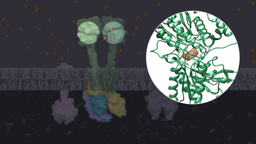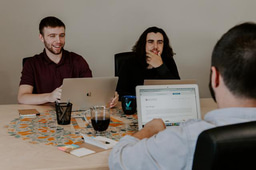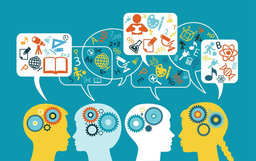A day in the life of… a cognitive science consultant for quality of life at work

I have always been interested in understanding how the human brain works and what factors affect our behavior. This led me to study biology at the Ecole Normale Supérieure (Paris, France), do a Master’s degree in neuroscience at the Sorbonne University, and then a PhD in the Brain, Cognition, Behavior doctoral school, also at the Sorbonne University. After my PhD I co-founded COG’X, a company that uses current knowledge in the broad field of cognitive sciences to help people preserve and develop sustainably their cognitive and social resources at work.
A typical day might see me…
Depending on which projects are ongoing, I might either facilitate a full-day training (by videoconference lately) on soft-skills such as on learning how to learn, give an interactive conference on cognitive load in the era of over-solicitation, or do a bibliography on the most effective programs to promote diversity and inclusion at work. The projects and topics are very varied, but every day my colleagues and I at COG'X seek to preserve and develop the cognitive and social resources of employees in a sustainable way, using cognitive science.
One of the most challenging parts of my role is…
To address my clients’ needs when I can, while explaining to them that cognitive science won’t be the miraculous solution to all their concerns. To make an impact on people and organizations, my work requires that I come up with new ways to popularize science and lots of pedagogy, to enable clients to change their perceptions of collaboration, learning, inclusion, over-solicitation, etc. We need to make employees, including managers and directors, feel and understand the need to consider the limits and the functioning of our brains and, once they are all speaking the same language, to adapt their work practices. At the same time, it also requires vigilance to avoid creating new neuromyths!
For instance, we start our training with information on how the brain works, such as on the limits of our attention and working memory. Then we invite employees to reflect on their work habits and identify what they could change to improve their cognitive well-being. This can be as simple as allowing yourself to turn off digital distractions while concentrating, abolish pop-ups once for all, and stop reading e-mails on your recovery times, among other approaches.
While warning about the serious dangers of certain practices on health and well-being, we must be very careful to avoid ‘Dos and Don'ts’ lists because transferring science results into new contexts is hazardous. Instead, we encourage people – managers in particular – to act on their professional environment, to experiment for themselves and with their team, and to find cognitive balance in their specific work context.
What I love about my work is...
My team and the topics we cover. COG’X, now has six employees, each of us working on lots of exciting projects according to our own area of expertise: attention and working memory, memory consolidation, emotion and social interaction, gender and hierarchy, etc. I have the opportunity to read a lot about very interesting aspects of the human mind and try to build bridges with people’s daily lives, trying out what might help people be more accomplished in the workplace in a sustainable way.
Over the years, the projects we work on have grown and we are increasingly committed to making an impact. Today I feel I found a fulfilling path to do cognitive science, in a way that makes more sense to me and surrounded by incredible people.
How I got there…
During my PhD, I worked on the neuronal corelates of memory consolidation during sleep. This thesis work allowed me to develop a critical mind, and analytical and synthesizing skills, but I also developed a pronounced taste for making cognitive science accessible to anyone without losing too much of the rigor that it requires.
During my thesis, I matured my thoughts on my professional project, and the desire to create my own way of working on science started to grow. I realized how much research work meant to me, but also how competitive the academic world could be, and I felt it would not satisfy me. I was not ready to make the sacrifices necessary to become an academic researcher and needed to see more concrete applications of my daily work. In this same period, I participated in various scientific mediation activities, and took great pleasure in sharing my knowledge. I was pleased to see how interested people were in learning more about the secrets of their minds. That is mostly what I do now!
With my current associate Gaëtan de Lavilléon, who was also a PhD student in my laboratory back then, we had started to work on an collaborative project concerning the impact of digital technologies in the cognitive overload at work. We observed that employees were very eager to understand more about the functioning and natural limits of their cognitive capacities, and about what they could do to feel better at work. Back in 2016, companies had started to be very interested in the cognitive approach, which brings a new perspective on the digital transformation in the workplace. That's how, with Gaëtan, Emma Vilarem and other collaborators, we came up with the idea to create our own company, COG’X.
My advice to early-career researchers interested in consulting...
Look around, find people you like to share time with, and talk as much as you can to others about what you want to do, your hesitations, your aspirations, your interests. You never know what precious tips they might give you that will set the path of your career later on.
During my PhD program, I made the most decisive choice for the rest of my professional life, without even being aware of it. Gaetan and I were told about a newly formed association called Cog'Innov and we joined it. This student association aims to popularize cognitive sciences with the general public and to find relevant and ethical fields of application for private and public organizations. I soon participated in its development as head of the publishing department, where I was pleased to encourage other PhD and Master degree students to write about their research topics, while helping them make it as accessible as possible. Then I joined the project on cognitive overload, when the opportunity to start COG’X came up. I never thought when I joined the Cog’Innov association that it would be the first step in my career in cognitive science consulting.
Top image of post: by John Hain from Pixabay





Join the FEBS Network today
Joining the FEBS Network’s molecular life sciences community enables you to access special content on the site, present your profile, 'follow' contributors, 'comment' on and 'like' content, post your own content, and set up a tailored email digest for updates.